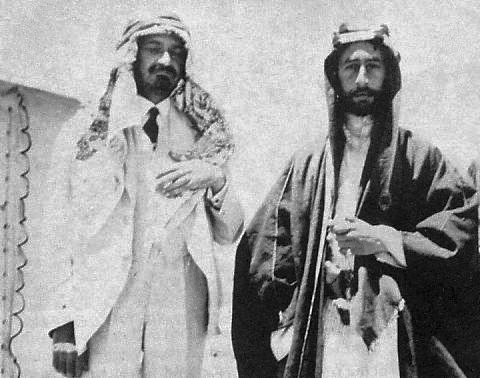In June 1918 Dr Chaim Weizmann, president of the Zionist Organisation travelled to Transjordan to meet Emir Faisal, son of King Hussein of Hejaz. They informally agreed that the Zionist organisation would support the creation of an Arab Kingdom after the war while Faisal and his associates would support a Jewish settlement in Palestine. The two met again in London in January 1919 where Colonel T.E. Lawrence translated from English into Arabic a document drafted by Weizmann and his associates. Its preamble stated that “mindful of the racial kinship and ancient bonds existing between Arabs and the Jewish people, and realizing that the surest means of working out the consumation of their natural aspirations is through the closest possible collaboration in the development of the Arab State and Palestine” the two parties agreed to recognise and implement the Balfour Declaration of 1917 calling for a Jewish national home in Palestine; to accept freedom of religion and worship there; to accept Muslim control of Muslim holy sites there, and the Zionist Organisation would help to develop the economic resources of an Arab State. Weizmann signed the Agreement on behalf of the Zionist Organisation while Faisal signed it on behalf of the Kingdom of Hejaz. However, he added a caveat to the document to the effect that: “If the Arabs are established as I have asked in my manifesto of Jan 4, addressed to the British Secretary of State for Foreign Affairs, I will carry out what is written in this agreement. If changes are made I cannot be answerable for failing to carry out this agreement.” Faisal submitted a written statement to the Supreme Council on 27 January and Weizmann did the same on 3 February. Faisal made a personal appearance to argue his case on 6 February and the Zionist delegation appeared before the Council on 27 February. Both groups then waited months for a decision. At the Conference of London in the spring of 1920 it was announced that Syria would be mandated by the League of Nations to France while Palestine and Iraq would be mandated to Britain. Since this was different to what Faisal had discussed with the British government the Weizmann-Faisal Agreement was now null and void as far as Faisal was concerned.
About the Author: Bob Stradling
Dr. Bob Stradling taught modern political history at London University before he moved to Scotland in the 1990s where he was appointed Senior Research Fellow and Director of a multi-disciplinary research unit at the University of Edinburgh. From the mid-1980s he also worked on a part-time basis for the Council of Europe as history education consultant and in that capacity was also actively involved in the planning to establish EuroClio in 1992. He has continued to work with the team at EuroClio ever since. In 2009, having retired from the University, he was invited by EuroClio to join an advisory board to discuss how best to develop a website for history educators, Historiana, and development began in 2010 with Bob as editor-in-chief. He is also the author of Teaching 20th Century European History (2001); Multiperspectivity in History Teaching (2003), joint author (with Chris Rowe) of Critical Moments in Recent European History (2008) and the editor of Crossroads of European History (2008).













